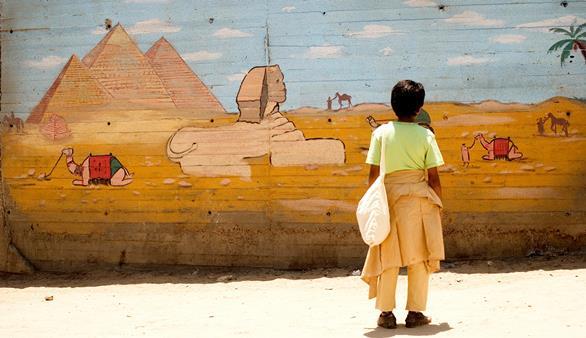This Egyptian drama takes place during the course of the
Egyptian Revolution in Tahrir last year, telling the story of a middle-class,
female advertising executive named Reem (Menna Shalaby) and her interactions with a
lower class man names Mahmoud (Bassed Samra) – a horse rider in a small village by the
pyramids whose business has died because of a lack of tourism. The film
explores the conflict between two ideologies as the woman attempts to bring he
liberal opinions to the small town and inspire them to join the revolution.
Mahmoud had been knocked down and stoned during the Tahrir
riots after riding in and attempting to quell the riots with a stick. He is the
joke of his town, constantly teased by friends and shamed to the point of his
children getting beaten. He takes out his frustration on his wife (Nahed el Sebai), a
subservient woman who, throughout the course of her interactions with Reem,
grows increasingly resilient and involved in the revolution.
Meanwhile, Reem cannot understand why the townspeople do
not support the revolution, and tries to show them how they can lift themselves
from poverty. She is a hyper liberal character, and director Yousry Nasralleh has no qualms
about showing her as an extreme. She is constantly yelling, and her anger rises to the point that her likability is constantly
Oh wait, did I mention that there is a random romantic
undercurrent between the two leads in this movie? Probably not, as it was an
extremely weak tie that was utilized in order to motivate the dialogue about
the politics rather than act as a B plot within the film. That being said, the
film was only able to be produced in Egypt because it was presented as a
romantic comedy, although the romance could have been done in a much stronger
manner.
Overall, the film was purely a didactic conversation about
two sides of the debate over the revolution, with the revolution emerging
victorious in the end. It was not very well-acted, although Samra did a
decent job, had low production value, and a weak plot. It was easily twenty
minutes too long and the constant sitting and standing of the characters as
they spoke was some of the most annoying blocking I have seen in some time.
I did learn a lot about the internal opinions of Egypt over
the revolution, and in the context of an international film, it was a feat to
bring this dialogue to the table and show the world the complex nature of the
debate. However, the film itself was poor quality as it tried to make too many
points and never followed through.
 |
| The characters constantly discussed the wall that divides the people from the tourism of the pyramid, yet never bring the idea back into the mix as a final symbol of the revolution. |
The lessons learned were not enough to salvage the film from
poor quality, so I’ll have to give it a C.


No comments:
Post a Comment